By JULIE MINDA
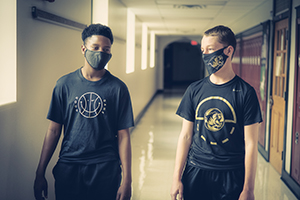
The Bentonville, Arkansas school district requires all staff and students to wear masks at its schools. Two Mercy Northwest Arkansas, staffers were on a community task force that recommended mask wearing and other steps to the district as it prepared for a return to in-person school.
In mid to late August, schools across the U.S. began resuming classes — with some of them offering just distance learning; some, in-person instruction; and some, a hybrid of the two. While the schools that are resuming face-to-face education have put safety measures in place to help prevent coronavirus spread, teachers, parents, students and others have expressed strong concerns about resuming in-person education.
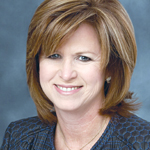
Williams
To help address their fears of contagion, medical and mental health providers in the Catholic health ministry have been sharing their expertise with their local schools and providing them with resources. They have been consulting on safety precautions, contributing their expertise to the drafting of reopening plans, hosting online informational forums, building out websites with tools and beefing up their mental health offerings, in order to help people navigate the transition back to school — whether virtual or in-person.

Dr. David Quimby responds live to questions posed during a July 28 virtual assembly that Omaha, Nebraska-based CHI Health hosted for educators to help them prepare for a return to school amid the pandemic. Quimby is a CHI Health - Creighton University School of Medicine specialist in infectious diseases.
"As people were preparing for back to school, we saw there were a lot of anxious teachers and parents. They were seeing a lot of information on television and social media — some of it inaccurate — and they didn't know what to be–lieve," said Mary Williams, public relations director for Omaha, Nebraska-based CHI Health. That 14-hospital network serving Nebraska and Southwest Iowa hosted a virtual conference in late July aimed at easing teachers' anxiety about resuming school in-person.
"We thought we would help give teachers and others the tools to return to school and the science to make informed decisions — to make better decisions," Williams said.
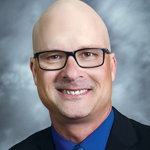
Hron
Addressing fear
Tim Hron is a mental health therapist with CHI Health – Creighton University Medical Center Bergan Psychiatric Associates. He moderated the two-hour virtual assembly that drew more than 450 participants, most of them educators. He said CHI Health was sharing its infection control and mental health providers' expertise via the assembly because "We think that fears will be reduced if people understand the facts."
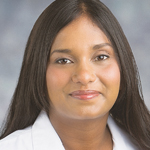
Vivekanandan
The assembly featured two infectious disease experts from CHI Health – Creighton University School of Medicine. Dr. Renuga Vivekanandan, an epidemiologist, explained the characteristics, transmission methods and symptoms of coronavirus; and Dr. David Quimby, an infectious disease specialist, fielded questions on everything from how to wear and store face masks to how to space desks for optimal distancing. They both emphasized the importance of masking, social distancing at 6 feet or more, hand hygiene and staying home when ill.

Quimby
CHI Health child and adolescent psychiatrist Dr. Monica Arora told the audience that children may have anxiety about the pandemic and about the social unrest prevalent throughout the summer. They may be worried, sad, defiant. She said teachers can help students articulate and explore their emotions by establishing trusting relationships and welcoming discussion about concerns.
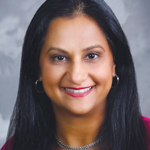
Aurora
CHI Health school-based mental health therapist Sheila St. Amant added that teachers can help kids adjust to the dynamics of the new school year, and handle their emotions, by establishing structure and routine in their classrooms.
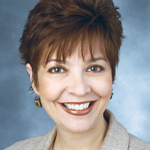
Williams
CHI Health mental health therapist Karen Williams focused on the importance of self-care, particularly for teachers. She recommended establishing routines that build resilience, including healthy eating, sleeping enough, exercising, going outside, journaling, praying and meditating. "You matter — and taking care of yourself matters," she said.
Beyond hosting the assembly, CHI Health created an informational website for the school community, provided all elementary schools in its service area with a book aimed at helping young children and adolescents handle their emotions, and published an online magazine covering COVID-related concerns.
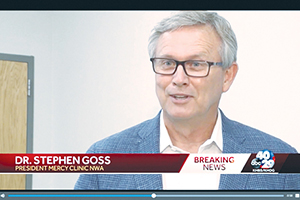
Dr. Stephen Goss, president of Mercy Clinic Northwest Arkansas, appears in news coverage on television station KHBS/KHOG. He became a trusted voice on school reopening issues in Bentonville, Arkansas.
Incremental steps
In Northwest Arkansas, Mercy physicians served on a reopening task force for Bentonville Schools. Dr. Stephen Goss, a pediatrician, internal medicine physician and president of Mercy Clinic Northwest Arkansas, chaired the task force of 12 community leaders. Dr. Lisa Low, a family practice physician and medical director of community health for Mercy Hospital Northwest Arkansas, served on the committee.
The group met weekly throughout the summer to give input and feedback on the school district's plan. Whether or not to require face masks was a flashpoint for the group and for the community, said Goss. The district accepted the committee's recommendation to require that all staff as well as students in kindergarten through 12th grade wear masks. Bentonville Schools were to open Aug. 24, with parents deciding whether their children would go back in-person or online.
Goss became one of the trusted voices and a regular contributor in the community's reopening debates. He told Catholic Health World, "There's no way to make the return to school risk-free, but each layer of precaution is an incremental step that lowers risk." Throughout the school year, the status of in-person learning will hinge on the level of viral spread in the community as well as in the schools.
He said his goal in representing Mercy and the task force in the community was to help people understand how to live more safely with the virus in their midst — and to feel reassured, and more comfortable and confident if they chose to send their children for in-person instruction, or return to jobs which require them to be at the school.
Shared experience
In Greenville, South Carolina, Dr. Marcus Blackstone, chief clinical officer of Bon Secours St. Francis Health System, has been a sounding board for the superintendent of a Greenville school district and for a Catholic school campus, as they honed their plans this summer for their reopenings. He also participated in a roundtable of South Carolina and local leaders convened by Michelin North America to discuss issues facing economically vulnerable communities as they prepared to reopen their schools.
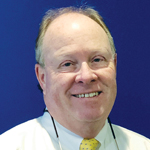
Blackstone
Blackstone said that five months ago members of the health care community faced fear and uncertainty as they exposed themselves to risk in the course of their jobs — the education community has the same trepidation now. He said Mercy had learned much about how to protect staff and patients with careful adherence to public health recommendations and wanted to share that wisdom with the school system. "I wanted to instill confidence about returning to school, and I wanted to educate the public on how to do this safely," he said.
His colleague Dr. Carson Felkel is system medical director for behavioral health at Bon Secours Mercy Health and lead psychiatrist for that system's Greenville market. Bon Secours Mercy Health is the parent of Bon Secours St. Francis Health System. Felkel said that both the system and the Greenville market have seen an uptick in mental health concerns among adults and children amid the pandemic. This includes heightened anxiety around the return to school, he said.
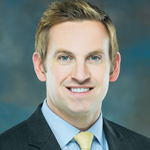
Felkel
Felkel and colleagues have created a series of short videos to help parents, teachers, Bon Secours Mercy associates and other community members to address their own fears and the fears of students.
Bon Secours Mercy has been bolstering its mental health resources for staff, including for those struggling with angst related to their kids' schools reopening, Felkel said. It has launched a daily online "pause" in which Bon Secours Mercy staff can spend about 10 minutes hearing prayers, guidance on stress reduction, and reflections from system mental health experts.
Felkel notes that community health needs assessments have consistently shown mental health concerns and substance abuse to be top concerns in Greenville, and COVID has exacerbated those problems. He said, "Mental health issues are bubbling up around the country … and we need to continue to create safe spaces for people to tell their stories" and get the help they need.
Avera Health of Sioux Falls, South Dakota, has created a suite of online information to help parents, students, teachers and other community leaders to reduce their risk of contracting the virus, or of spreading it. The resources are at www.Avera.org/COVID-19.
Essentia Health of Duluth, Minnesota, offers a digital tool kit with information on masking, social distancing, other safety measures and medical considerations.
That tool kit is here.